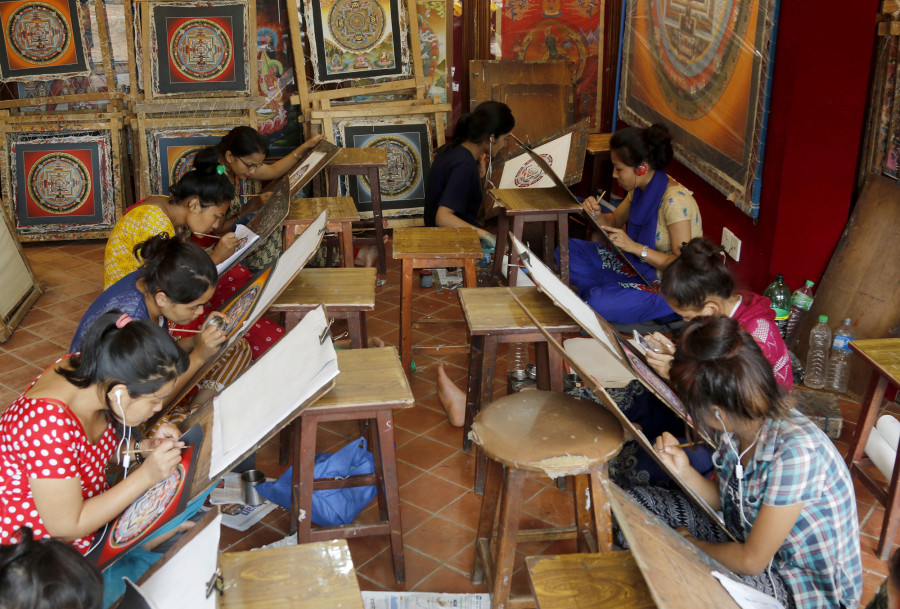Money
Covid-19 stops rising women entrepreneurs in their tracks
They are involved in sectors such as tourism, food service, agriculture and manufacturing enterprises that require daily transactions to stay afloat.
Aditi Aryal
Madhu Maya Bashyal runs a home stay in Tansen, a scenic hilltop town in west central Nepal. Her husband was a former migrant worker who lived in Kuwait for 18 years. He was very unhappy there, and Bashyal decided to start a business of her own so she could make enough to allow him to return home.
The 37-year-old entrepreneur launched a series of business ventures, including a clothing retail store and brokerage firm, all of which were unsuccessful.
In 2018, the couple opened a home stay from their house where guests would come and stay and enjoy a cultural experience, which proved to be extremely popular with foreigners.
The couple began to work hard together, and their business prospered. Their home stay was fully booked for two years by Japanese nationals who were working in Tansen.
Buoyed by their success and anticipating a surge in international and domestic tourists in 2020, slated to be celebrated as Visit Nepal Year, Bashyal planned to expand and borrowed Rs2.2 million using her house as collateral.
“For a small business operating from home, Rs2.2 million is a lot of money,” she said. “When the pandemic hit, the Japanese nationals left in March after which there have been no guests. We were told we would be compensated, but we are yet to receive any payment.”
Bashyal has been making her monthly interest payment religiously, fearing foreclosure by her bank. She filed her annual tax return last month. Without a regular income source, she has been dipping into her savings which are receding dangerously.
A large number of women entrepreneurs like Bashyal are involved in micro, medium and small enterprises that require daily transactions to remain afloat. Covid-19 has thrown them into financial insecurity without regular income or effective social safety nets which has reversed generations of progress in women entrepreneurship in Nepal.
According to the National Economic Census conducted in 2018, women owned nearly one-third of the total businesses in various sectors such as hospitality and tourism, food service, agriculture and manufacturing enterprises.
“Big businesses are diversified, meaning they have multiple fall back options,” Nivita Pradhan, vice-president - women, Nepalese Young Entrepreneurs’ Forum, told the Post. “Smaller businesses do not have the luxury, and if a firm collapses, that’s the end of it.”
In the past decade, women entrepreneurship in Nepal has come a long way.
“There were very few women entrepreneurs 10 years ago,” Darshana Shrestha, vice-president of the Federation of Women Entrepreneurship Association of Nepal, told the Post.
“Women enterprises that were operational then were seen as side businesses or hobbies for women who were primarily homemakers, and their children had grown up and they had more free time. Most of these enterprises operated in sectors such as handicrafts or pickle making, stereotypically portrayed as women enterprises.”
In Nepal, societal constraints hint towards gender discriminatory cultural beliefs and practices, which has graver repercussions for women in entrepreneurship because the playing field has never been even.
According to Pradhan, women face additional challenges to obtain finance since they do not hold property to put up as collateral, and are not in a position to obtain the government’s collateral-free loan incentives.
“Most women do not have knowledge about such benefits, and even if they do, most banks have been found to reject applications of even viable businesses. The government’s incentives look great on paper, but have not been translated into practice effectively.”
Pabitra Gaire is a farmer. The 31-year-old former Maoist combatant is perhaps the only woman in Arghali who practises commercial agriculture. Upon voluntary retirement from the People’s Liberation Army, she received some money which she wanted to invest. She additionally took some loans from a cooperative and leased 15 ropanis to establish dairy and vegetable farms.
Her business was going very well, but the pandemic and lockdown took their toll. After vehicles stopped plying, transporting her products to market has been a challenge.
“Before the pandemic, I was selling about 90 litres of milk per day,” Gaire told the Post. “Now, I hardly sell 40 litres. When the lockdown was temporarily lifted, I sold some beans that had been harvested; but after that, my land has been barren. I have been waiting for seeds, fertilisers and cattle feed for about a month now, but they have not yet arrived.”
Selling her produce online is not an immediate solution because she does not have adequate know-how of doing it herself, and neither do a lot of people in her locality.
Like for Gaire, selling products online is not feasible for many businesses. “The commission charged by online sites is huge; and for traditional businesses like handicrafts and pickles, traditionally owned by women, that is too expensive,” Pradhan told the Post.
“My successful business has been a way to prove that women entrepreneurs are on the same footing as men. I know the men around here respect me because I am a hardworking farmer, and I make a lot of money,” said Gaire. “I’ve also been told that they think I am intimidating because I deliver my produce on my motorbike.”
The financial security that comes with entrepreneurship helps women see upward mobility in their social, political, and familial status. “With money, women have increased control over decision making and are likely to suffer less abuse from their partners,” Shrestha told the Post.
While the lockdown may have hit their businesses hard and they are struggling to remain afloat, entrepreneurs are more resilient than ever. Both Gaire and Bashyal have in the past been recognised as outstanding entrepreneurs in Palpa, and have received felicitations from the local government with the support of Daayitwa, an NGO that promotes youth entrepreneurship.
“My business has been hugely affected, but I am optimistic about kick-starting it again,” entrepreneur Bashyal told the Post. “When I had nothing, I built this business on my own to bring my husband back. I am not willing to send him back.”




 22°C Kathmandu
22°C Kathmandu














